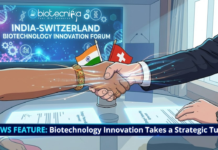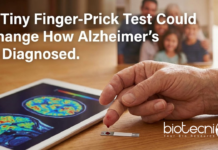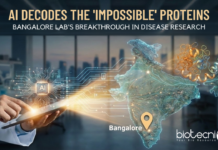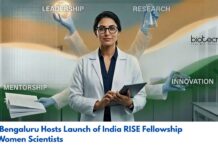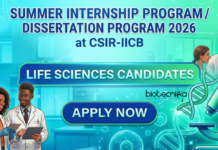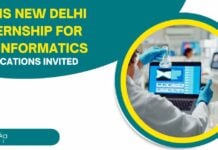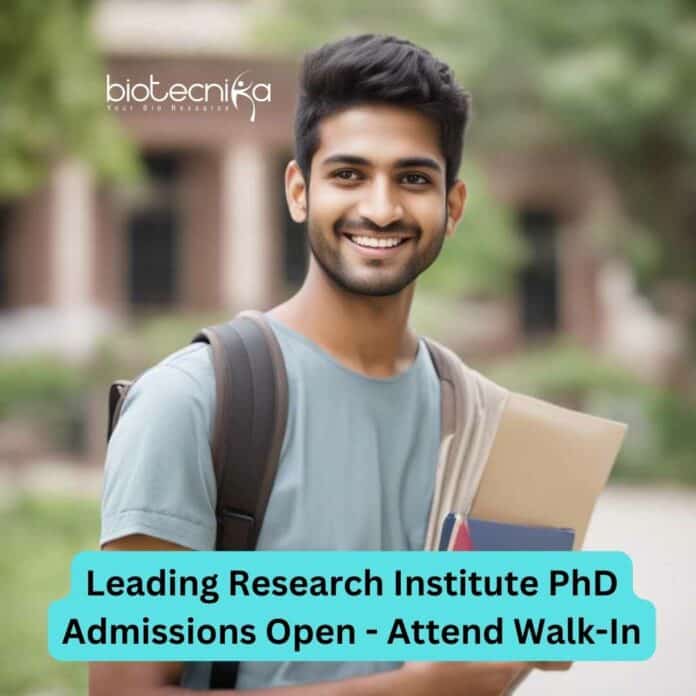NIBMG PhD Program Admissions – Attend Walk-In-Interview
NIBMG PhD Program Admissions – Attend Walk-In-Interview. National Institute of Biomedical Genomics PhD Program 2023 Admissions. Interested and eligible applicants can check out all of the details on the same below
Possible Interview Questions for the Successful PhD Candidate are posted below.
This call expires in
NATIONAL INSTITUTE OF BIOMEDICAL GENOMICS
(An Autonomous Institution of Department of Biotechnology, Government of India)
P.O.: N.S.S., Kalyani 741251, West Bengal, India
Tele: +91-33-29772151
NIBMG/ADMIN/ESTB/PHD PROG-1/ADVT/2023-24/164
INFORMATION FOR STUDENTS INTERESTED TO PURSUE DOCTORAL RESEARCH AT THE NATIONAL INSTITUTE OF BIOMEDICAL GENOMICS (NIBMG), KALYANI
Applications are invited from suitable candidates to pursue doctoral research at NIBMG. The selected students are expected to work on human diseases with emphasis on gaining genomics and biological insights into disease mechanisms using clinical samples and appropriate models, both in silico and in vivo. NIBMG is equipped with state-of-the-art technologies which include single-cell sequencing and Next Generation Sequencing platforms, high-end computational and bioinformatics facility, cell and molecular biology facilities, genetic engineering including cutting-edge CRISPR-Cas Genome editing laboratories, FACS (cell sorter), low and high- resolution imaging facility, Multiplex Elisa/ALPHA-LISA, state-of-the-art zebrafish, proteomics, metabolomics and microbiome facilities. The broad areas of research on which students are expected to work are listed below:
Genomics of
A. Infectious disease
B. Chronic disease
C. Cancer
D. Computational Biology and Statistical Genomics
Fellowship: Admissible as per Govt. of India rules as provided by respective funding agency.
A WALK-IN INTERVIEW WILL BE HELD AT NIBMG on 11-09-2023 (Monday) from 10-30 AM. Candidates must report at the NIBMG Main Gate at 9-00 AM.
Eligibility for PhD Interview:
- Candidates should have a valid award of JRF (CSIR-UGC JRF/ DBT-JRF/ ICMR-JRF/ DBT-BINC, NBHM, or equivalent except DST-Inspire), whose last date of validity should not be earlier than 31st May 2024. If candidates who are in the final year of their master’s degree programme and are in possession of an award of a JRF, are selected, they will have to submit their final degree certificate by 30th November 2023 at the latest.
- Candidates should have Masters (postgraduate) degree or 4 years B. Tech. in any branch of sciences with interest in pursuing research in Modern Biology, having at least 55% or equivalent Grade Point Average (GPA) (A relaxation of 5% of marks, shall be allowed for SC/ST/OBC and Persons with Disabilities).
- Candidates who have qualified in GATE/ JEST/ JGEEBILS/ NET (LS) etc., but who do not have a valid award of JRF mentioned in (1) above, or equivalent, are ineligible to apply.
- No student awarded the ICAR Fellowship will be eligible to participate in the Ph.D. Programme in NIBMG
APPLICATION FEES
Candidates should send Rs. 250/- (Rs. 100/- for SC/ST/EWS/PWD candidates) as application fees to the bank account as mentioned below within 06-09-2023 and keep the proof of transaction details with them.
- Account No. – 0579050053288 (Current Account)
- Name – National Institute of Biomedical Genomics
- IFSC Code – PUNB0057920
- Name of Bank – Punjab National Bank (Kalyani Branch)
INFORMATION –
- NIBMG Ph.D. program is a residential full-time program. The selected candidates have to stay on campus. No relaxation will be provided under any circumstances.
- Other terms and conditions of the fellowship will be directed by the funding agency awarding the fellowship. NIBMG will not be responsible for providing fellowships.
- The upper age limit for JRF shall be 28 years which is relaxed up to 5 years in the case
of candidates belonging to SC/ST/Women/PWD and 3 years in case of OBC candidates,
or as applicable. - Reservation will be as per Government of India guidelines.
- In case of any queries, candidates should e-mail at ([email protected]) Phone enquiries will not be entertained.
- Candidates shall have to produce all the original documents/certificates in support of at their age, reservation category, educational qualifications, Valid Fellowship, Aadhar Card and the proof of depositing of fees along with one set of a self-attested copies of the same, at the time appearing for interview for verification, failing which he/she will not be allowed to appear for interview.
- If large number of candidates appeared in the Walk-In, The Institute also reserves the right to conduct a second round of interview to minimize the number and not to call for the 2nd round of interview (if applicable)those candidates whose score in the 1st round of interview fall below a certain cut-off determined by the Institute.
- The name of the successful candidates will be displayed on the Institute website.
- Eligibility criteria including an upper age limit will be reckoned on the last date of submission of application.
- Before appearing in the Walk-In interview, the applicants should ensure that they possess at least the essential qualifications and other conditions specified in the advertisement. If a candidate is found ineligible, his/her candidature will be cancelled at any stage of the interview process. It may be noted that even if a candidate qualified in the interview and subsequently it is found that he/she does not fulfill the eligibility criteria, his/her candidature will be cancelled.
- No TA/DA is admissible for appearing for the interview.
Check the notification below
Here are five possible interview questions that can be asked in the technical round for the PhD candidates:
1. Question: Can you explain your research interest in the context of the mentioned areas of genomics research in the institute? Answer: I am particularly interested in exploring the genomics of infectious diseases, as it aligns with my previous research experience. I believe that studying the genetic aspects of infectious diseases can provide insights into their mechanisms and potential therapeutic strategies.
2. Question: Could you elaborate on your experience with single-cell sequencing and Next Generation Sequencing platforms? How have you applied these technologies in your past research? Answer: During my Master’s program, I had the opportunity to work with single-cell sequencing technologies to analyze cellular heterogeneity within tumor tissues. I also used Next Generation Sequencing platforms to profile the transcriptomes of various cell types. These experiences helped me understand the power of genomics in uncovering intricate biological mechanisms.
3. Question: In the context of the project’s focus on disease mechanisms, can you provide an example of how genomics data can be utilized to uncover insights into chronic diseases? Answer: Certainly. For instance, in chronic diseases like diabetes, genomics data can reveal genetic variants associated with disease susceptibility. By comparing the genomes of affected individuals with those of healthy individuals, we can identify potential genetic markers that contribute to disease development. This information can guide further functional studies to understand the underlying mechanisms.
4. Question: The project emphasizes both in silico and in vivo research. How comfortable are you with working on both computational analysis and laboratory experiments? Answer: I am comfortable with both aspects. In my previous research, I have employed computational tools to analyze genomics data and identify potential candidate genes. Simultaneously, I’ve worked in wet lab settings to validate these findings using experimental techniques. This dual approach allows me to bridge the gap between computational predictions and experimental validation.
5. Question: The project mentions the use of cutting-edge CRISPR-Cas Genome editing laboratories. Can you share your experience with genetic engineering techniques, particularly CRISPR-Cas9, and its potential applications in genomics research? Answer: I have hands-on experience with CRISPR-Cas9 technology during my Master’s thesis. I used this technique to introduce targeted genetic modifications in cell lines, which helped me study the functional impact of specific genes on disease phenotypes. CRISPR-Cas9 has revolutionized genetic manipulation and provides a precise way to investigate gene functions and disease mechanisms.
By responding to these questions, you can showcase your knowledge, skills, and alignment with the research focus of the institute’s PhD program.
Editor’s Note: NIBMG PhD Program Admissions 2023. NIBMG PhD Program Admissions – Attend Walk-In-Interview. Please ensure you are subscribed to the Biotecnika Times Newsletter and our YouTube channel to be notified of the latest industry news. Follow us on social media like Twitter, Telegram, Facebook

